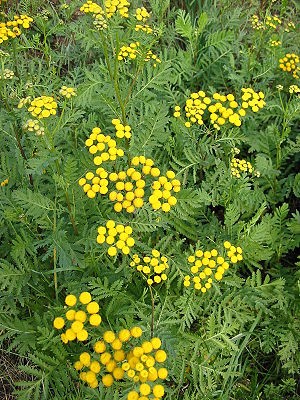Note: This is a project under development. The articles on this wiki are just being initiated and broadly incomplete. You can Help creating new pages.
Difference between revisions of "Tanacetum vulgare - Tansy"
(Created page with "thumb|right|''Bitter buttons'', ''Tansy'' '''Bitter buttons''' (Tanacetum vulgare) is a perennial, herbaceous flowering plant of...") |
(No difference)
|
Revision as of 09:53, 23 January 2017
Bitter buttons (Tanacetum vulgare) is a perennial, herbaceous flowering plant of the aster family, native to temperate Europe and Asia. It has been introduced to other parts of the world including North America, and in some areas has become invasive. It is also known as common tansy,[1] cow bitter, or golden buttons.
Contents
Description
Tansy is a flowering herbaceous plant with finely divided compound leaves and yellow, button-like flowers. It has a stout, somewhat reddish, erect stem, usually smooth, 50–150 cm (20–59 in) tall, and branching near the top. The leaves are alternate, 10–15 cm (3.9–5.9 in) long and are pinnately lobed, divided almost to the center into about seven pairs of segments, or lobes, which are again divided into smaller lobes having saw-toothed edges, giving the leaf a somewhat fernlike appearance. The roundish, flat-topped, button-like, yellow flower heads are produced in terminal clusters from mid-to-late summer. The scent is similar to that of camphor with hints of rosemary. The leaves and flowers are toxic if consumed in large quantities; the volatile oil contains toxic compounds including thujone, which can cause convulsions and liver and brain damage. Some insects, notably the tansy beetle Chrysolina graminis, have resistance to the toxins and subsist almost exclusively on the plant.
Uses
- Tansy was used to treat intestinal worms, rheumatism, digestive problems, fevers, sores, and to “bring out” measles.[2]
- Tansy was used as a face wash and was reported to lighten and purify the skin.
- Although most of its medicinal uses have been discredited, tansy is still a component of some medicines and is listed by the United States Pharmacopeia as a treatment for fevers, feverish colds, and jaundice.
- Traditionally, tansy was often used for its emmenagogue effects to bring on menstruation or end an unwanted pregnancy, and pregnant women are advised to not use this herb.
- Some traditional dyers use tansy to produce a golden-yellow color. The yellow flowers are dried for use in floral arrangements.
- Dried tansy is used by some bee-keepers as fuel in a bee smoker.
